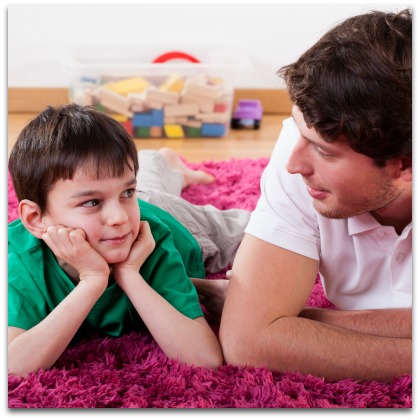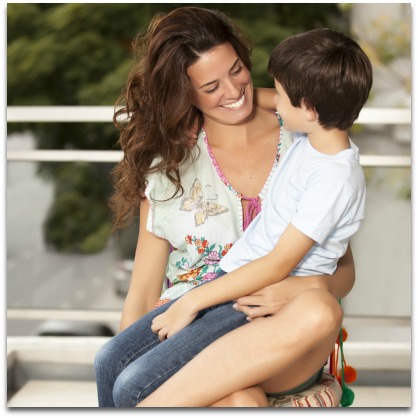 Change. One of the many things in life that is inevitable. We as adults have learned this through time and experience.
Change. One of the many things in life that is inevitable. We as adults have learned this through time and experience.
Trying to cope with change can be hard on anyone of any age. But it can be especially hard on little ones.
Big life changes such as a move, divorce, starting school, or any significant change in daily routines can set off a cornucopia of reactions.
I know from personal experience how hard it is on a child and parent alike to cope with change. This past summer was a summer of change for our family. My three year old daughter took to the new changes with open arms, yet my five year old son did not.
My husband had recently landed a new job a few states away and would be gone on business for three weeks at a time. As a result, we decided I should quit my full time job to become a stay at home mom.
Awesome, right?
Well…not at first.
My children now no longer went to the sitter they had been with for the past two years and my son was out of pre-school for the summer. I thought for sure things would feel like a storybook and that we would all be happy as clams. Boy was I wrong.
Unbeknownst to me, these changes would set off a whole host of behavioral problems with my son who became angry and aggressive. There always seemed to be an issue with anything and everything.
Previously, he had always been a happy morning person who was quick to laugh and play. But now, my son was grumpy and refused to talk to anyone for hours after waking up. He would scream and yell at his sister and myself multiple times a day. I began to feel frustrated, confused, and, at times, a bit worried.
What was going on with my son? He had always been strong willed but he’d never behaved quite like this.
It took a few weeks, but before long I realized the root of our problems. My sweet boy was experiencing stress from all of the changes in his life.
My first instinct was to brush it off. What five year old WOULDN’T want their mom at home with them all day? Sure his dad was gone for weeks at a time, but I was there to make up for it…right?
Wrong. There were just too many new experiences going on for him. I had to figure out some way to ease him into our new lifestyle.
I began researching and reading on how to help him cope with change.
After many nights of looking online, reading articles, and a bit of trial and error, I discovered a few ways to make him feel more secure.
Here is a list of 10 ways I helped my child cope with the stress of change:
1. Talk
 Seems simple enough right? But all too often we as parents forget that our children need us to talk to them about what’s going on in their lives.
Seems simple enough right? But all too often we as parents forget that our children need us to talk to them about what’s going on in their lives.
It is important not to ignore the changes and expect your child to figure things out on his or her own. Acknowledge all of your child’s new changes.
Let them know you realize how hard it can be to get used to new things. Give them a few examples of how you felt during changes in your younger years. Kids love listening to stories about when their parents were little.
2. Listen
When your child is ready to talk (this may take time for some children), be sure to give them your ear. Letting them know you are there for them can make them feel more secure in their feelings.
It took a little while for my son to begin talking to me about his dad being gone so often. Most of the talking seemed to be done by me at first. However, after my son saw that I was open to talk about my own feelings, he began to open up. I made it a point to always make eye contact and truly show him I was interested in what he had to say.
And you know what? I could always tell that he felt a little better after I gave him my gentle and undivided attention.
According to Sagari Gongala in 13 Tips to Understand Your Child’s Psychology Better, “Not only should you listen, but also let your child know that they are being heard and taken seriously.” It is just not enough to listen while folding clothes or cooking dinner… you need to truly be present and focused on what they have to say.
3. Offer choices
Sometimes, children exhibit negative behavior during new changes because they feel out of control. They are used to one routine and now may not know what to expect from day to day.
Offer them choices throughout the day and give them two options.
Which one of these books would you like to read?
Which one of these outfits would you like to wear today?
Would you like to go to the park or the library this afternoon?
Would you like to color or make a craft this morning?
Letting them make some of their own choices, within reason, can be a huge help towards coping. According to Marianna Pogosyan, Ph.D. in Helping Children Through Transitions, “Whether it’s big ones (e.g. which school to attend) or small ones (e.g. what pair of pants they wear), having them participate in decision-making will help them feel like not everything is out of their control and thus, help to boost their confidence.”
Even we as adults can start to feel anxious and frustrated when we don’t know what to expect. Or when someone else is making all of our decisions for us.
When I began offering my son more small choices during the day, he seemed to hold his head a little higher. I could tell that he enjoyed being able to have a say in some of the daily events.
4. Let Them Be Upset
 We all have emotions in response to change and children are no different. For most of us, there has been at least one time in our lives where we felt the need to have a good cry. Little ones need to be able to express their emotions just like adults do.
We all have emotions in response to change and children are no different. For most of us, there has been at least one time in our lives where we felt the need to have a good cry. Little ones need to be able to express their emotions just like adults do.
If your child is suddenly crying about something that seems silly to you, try not to scold or belittle them. This is one way for them to get their frustrations out about their current changes.
One time in particular sticks in my memory. I had put a roast in the crock pot and let it cook all day. I was extremely excited to finally taste it and so was my daughter.
I fixed our plates, set them on the table, and called me son over for dinner. He sat down and gave the meal a disgusted scrunch of the nose and flipped the plate over. I was mortified and, to be honest, a little hurt. Before I could even say anything he began to yell that it was “gross” and then began to cry.
At this point I was really steaming with anger. I mean, he was right there when I added the ingredients to the crock pot and even nodded his head when I asked if he was excited to eat it later on. He had always loved roast before…but now he was flipping over his plate and having a monster emotional meltdown?!
I clenched my teeth, took a deep breath, and tried to hold back my own tears. It was during my typical “count to 10” ritual that I remembered the article, Helping A Child Adjust to Two Households or Other Changes in Care by Janet Lansbury. She said:
“With young children, the feelings often don’t show up blatantly and openly in an obvious way that’s easier for us to understand. They’re more likely to show up as testing behavior, unreasonable behavior, resistance, fragile emotions around a lot of things that don’t seem to have anything to do with this transition they’ve made.”
I realized he must be hurting about something else and not just my “gross” dinner. I walked over and hugged him while he clung to me. All my son truly needed at that moment was a good cry and for his mommy to be there for him.
5. Keep a Routine
While it may not be the same routine as before, try to keep it similar. Children thrive on routine because it makes their daily lives feel predictable. Children need that type of predictability to feel secure, happy, and healthy. Without structure, our children will feel a sense of chaos which only breeds more stress.
After I became a stay at home mom, I did not quite structure our household in the way that was best for our family. Some days I would let my children play the entire morning and afternoon until they seemed to get bored and only then would I intervene and offer new things to do. Each day seemed to bring more crankiness and more tantrums.
Before long, it dawned on me that their days had been structured both at the sitter and at my son’s preschool. They (my son especially) were relying on me to give them some sort of predictability.
If I wanted our home to run smoothly, I had to create our own daily routine…and fast. I implemented many things that they were used to such as story time and craft time. Within about two weeks, my children knew what to expect and when. And I saw huge improvements in their behaviors!
6. Create New Rituals
Everyone likes to have something to look forward to. Whether it be going to the library on Tuesdays or movie night on Fridays, it’s important to invite new daily or weekly ideas into your schedule.
After our new lifestyle had begun, one time of the day in particular was especially hard for my son. Bedtime.
Bedtime had long been a chance for my husband to lay with my son, talk for a bit, and say his nightly “good night, sleep tight, don’t let the bed bugs bite”. When my husband began his new job and was no longer there each night, my son became restless and seemed to hate going to bed.
I tried to do the same ritual as his daddy but I could tell it just wasn’t enough. So, I began our own new ritual of reading a book to him each night before bed. He again started to enjoy laying down to listen to his nightly story and while he still became restless on occasion, this special time for us seemed to make a world of difference.
Here are a few ideas of fun rituals that may help your child feel less stressed about change:
- craft day
- game night
- movie night
- nap time song
- back rub at bedtime
- silly faces in the morning
Even the smallest of rituals once a day, or even once a week, is sure to put a smile on your child’s face and give them the stability they need.
7. Give Warning
 Talk to your child about new changes ahead of time. It will be much easier for your child to process their new lifestyle if they are given ample explanation of upcoming changes. This is a great coping tip that you can find in just about any article pertaining to changes for children.
Talk to your child about new changes ahead of time. It will be much easier for your child to process their new lifestyle if they are given ample explanation of upcoming changes. This is a great coping tip that you can find in just about any article pertaining to changes for children.
Even though your child cannot predict how they will feel during the new changes, it is important to plant the seed. Let your child know what will be changing and how it might affect your day to day life.
In this aspect, repetition is going to be key. It will not be enough to warn your child once, or possibly even twice, of the impending changes. Continue to remind them until said changes have taken place.
This is one thing I wish I would have taken into consideration before I quit my job and my husband took his new job. We talked to our children maybe one time about what was going to happen and figured that was sufficient enough. Looking back, I was being pretty dense in my thinking. But lesson learned for sure!
8. Focus on the Positive
Even if your family’s new changes circle around negative situations, it is always important to look on the bright side for your child’s sake. Oftentimes our children feed off of our emotions.
If you are constantly talking about the negative aspect of your new lifestyle, your child is going to do the same. To help ease their stress and anxiety, focus on the positive!
According to Marilyn Price-Mitchell, Ph.D. in Negativity and Your Child’s Brain: How to Help Kids Stay Positive,
“When we speak negative thoughts, whether they are about illness, fear, worry, disapproval, or even a simple ‘no,’ additional stress chemicals are released. And this doesn’t stop with our brains. The brains of those within earshot are changed too, causing anxiety and irritability in our listeners.”
I will admit, there were times where I was not as positive as I should have been. Some nights I would catch myself saying out loud, “I really wish your daddy was here to help me!” It became pretty obvious that when I mentioned things like that, my son’s stress level would rise and he would also begin talking about the negative aspects of our situation.
Though it can be hard at times, try your best to speak about your family’s new changes in the most positive way possible.
9. Accept That Coping Takes Time
Everyone copes with new changes in their own time. It is important not to put a time limit on how long your child is to be upset or stressed.
Although it may be frustrating if your child seems to be upset for longer than you’d hoped, remember that they are an individual and need to process their feelings and emotions in a time frame that works for them.
10. Listen to Your Gut
We all have that parental instinct. If your gut is telling you that more is going on than the stress of your child’s new routine, listen to it!
It is never a bad idea to make an appointment with a child therapist or child psychologist if you feel that your child’s stress goes beyond your new changes.
The 2-Minute Action Plan for Fine Parents
If your family is going through new changes, take a moment to reflect on these questions:
- How much does my child know about this transition and the change that is coming?
- How have I been helping my child through this transition so far?
- Has my child been acting out since these new changes were implemented?
- In my child’s eyes, what might be the hardest part of our new routine?
- How can I change my own attitude in a way that may help my child cope?
The Ongoing Action Plan for Fine Parents
Throughout the next week, take time to step back and assess your child’s reactions to their new lifestyle. Remind them that you love them and are there for them. Even during times of tantrums and negative behavior, try to keep in mind that they may be reacting to the stresses of change.
Also, think about what new routines you can implement that will help create the stability they need in their new life situations. Do you need to have a schedule? Or will making sure you do something with them once a day be enough?
Our lives are always changing and presenting our families with new obstacles and transitions. Remember that even changes you may think are positive can still be tough for your little one. Be ready to help your child transition in the smoothest way possible.
And like they always say…”this too shall pass.” You’ve got this!
Thank you for this.
2 years later there is a pandemic going on in the world and my son is not coping with the fact that things are going back to the old routine as we slowly resume pre-school and life in general. He even hates the fact that he is getting his permanent teeth in front. It’s all to new and too many changes at once. The part about disgusting food also rang true to me, because even eating new things and trying new flavors are now issues.
I’m very anxious about it too and reading this article, I feel better. Thank you.
#Singlemotherto5yo
Nice read Sarah. We relocated as a family from France to Los Angeles earlier last year and our daughter took it hard, the first 2 months were difficult and saw some change in her behavior. As you have pointed out its okay to let them get act up, it helps release tension. Hearing them out and finally talking work wonders.
Knave, I am so glad you found my article useful! I imagine it must be very difficult without any child therapists or psychologists there. The internet is such an amazing tool and it’s wonderful you were able to find this blog.
Thank you Sarah, this answers a lot of questions for me. my life is a roller-coaster and as a first-time-(single)-parent i couldn’t confidently assess whether or not i was doing the right thing by my wonderkid in relation to the whirlwind of change that has recently encompassed our lives. i also live in a country where there are no child therapists or (psychologists at all!) so professional advice is outta the window! this website in general is turning a fire-breathing-monster into a proper parent so i thank you all for contributing to it!